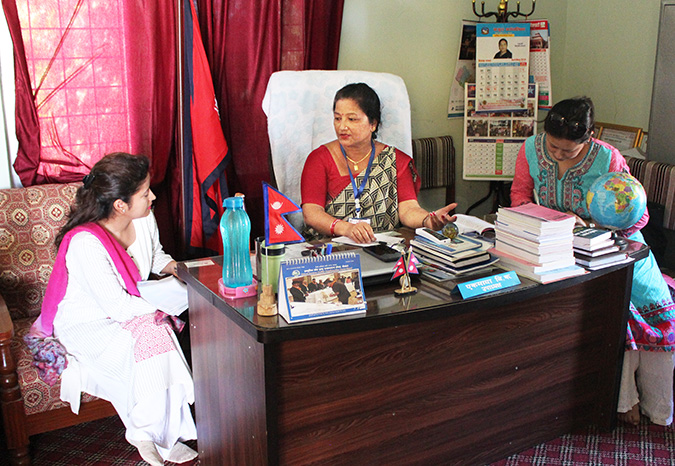Women rise to political leadership in Nepal with help from a UN Women project
Date:
Author: UN Women Nepal
Khajura, Nepal — The future did not always look promising for Ek Maya B.K.
Eighteen years ago, her husband was killed in the cross-fire between Government forces and insurgents. Suddenly, Ek Maya was left alone to take care of their two daughters, in the agricultural community of Khajura in Banke district in mid-west Nepal. Not only did she have to struggle to make ends meet, but she also had to endure gender- and caste-based discrimination as a single woman from the Dalit community, a low-caste group in Nepal.

Ek Maya joined a network of women affected by the insurgency and got involved in social and political issues in her community and then in activities of CPN UML, a Communist party. But she was not able to secure a distinct space for herself in the party.
Things changed after EK Maya joined a leadership development project run by UN Women Nepal in partnership with a consortium of six women’s networks led by SAARC Business Association of Home-based Workers (SABAH Nepal). Under UN Women Nepal’s Advancing Women’s Economic Empowerment Programme, the project started in July 2016, when EK Maya joined, and runs to this September, covering six districts in Nepal. The Government of Finland provides funding.
Today, Ek Maya, 46, is Vice Chair of Khajura Rural Municipality, and on one recent visit to her office, she was seen busy finalizing the new fiscal year budget and policy plans for the Municipality.
The consortium of women’s networks involved in the UN Women’s leadership project grouped conflict-affected women, home-based workers, rural women, women living with HIV and AIDS, survivors of human trafficking, and female migrant workers who have returned home. The project provided these women training on leadership skills, laws and policies related to gender equality, women’s empowerment, and the electoral system. The trainings also strengthened the institutional capacities of the women’s networks so they can more effectively advocate for their concerns in contacts with political parties, women’s alliances, planning and implementation bodies, community-based organizations, village groups, and professional associations.
This skills-training and network-building took place amid Nepal’s transition from a unitary to a federal governance system since the new Constitution was promulgated in 2015. In the series of trainings, the women learned about policy tools and information related to political participation and gender inclusion, the local governance system, gender laws, planning procedures and voter education provisioned by the new Constitution.
Experts such as lawyers and current and former bureaucrats did the trainings with technical and financial support from UN Women.
Ek Maya joined the project as soon as she heard about it.
“Being part of the leadership project was like a dream come true to me as it helped me gain knowledge, skills and motivation to be engaged in politics,” she says.
With new knowledge and skills, Ek Maya negotiated with party colleagues for her to be fielded as a candidate in the nationwide local elections in 2017. Her continuous efforts and lobbying helped her get the candidacy for Rural Municipality Vice Chair. The UN Women project also helped her design a political campaign. Her strong campaigning, unflinching determination, and commitment to the development of her community led to victory.
“The training gave me confidence to compete in the election,” says Ek Maya, proudly. “I am now excited to serve my community and promote women’s rights.”
The project has trained a total of 180 women. Of them, 25 women contested the 2017 local elections; the elections were the country’s first local polls in 20 years – before, bureaucrats administered local bodies. Seven of the women won seats as either ward members or vice chairs.
After the elections, women occupied about 41 percent of posts at the federal, provincial and national levels of government in Nepal. A total of seven women were elected mayors of municipalities, 11 chairpersons of rural municipalities, 276 deputy mayors and 424 vice chairs of rural municipalities.
Women now occupying decision-making positions in Nepal include many members of marginalized groups. More than 6,500 Dalit women are among the more than 14,000 female elected representatives.
However, challenges remain. Ek Maya said some of elected representatives, especially women, have limited ability to carry out their judicial and executive duties. The country’s discriminatory social structure and norms also are key challenges.
“Our society is not used to women leaders. When male leaders say something, people clap but when female leaders say the same thing, people laugh,” Ek Maya said. “We, the female leaders, now need more support from all sectors to prove ourselves.”
For further information, please contact
Ashma Shrestha
Communication for Development Officer, Women’s Economic Empowerment Unit
UN Women Nepal Country Office
House No. KA1/333, Thapathali Heights, Kathmandu, Nepal
Tel: +977-1-4255110/4216028/4239089 | Email: ashma.shrestha@unwomen.org